
 i_need_contribute
i_need_contribute
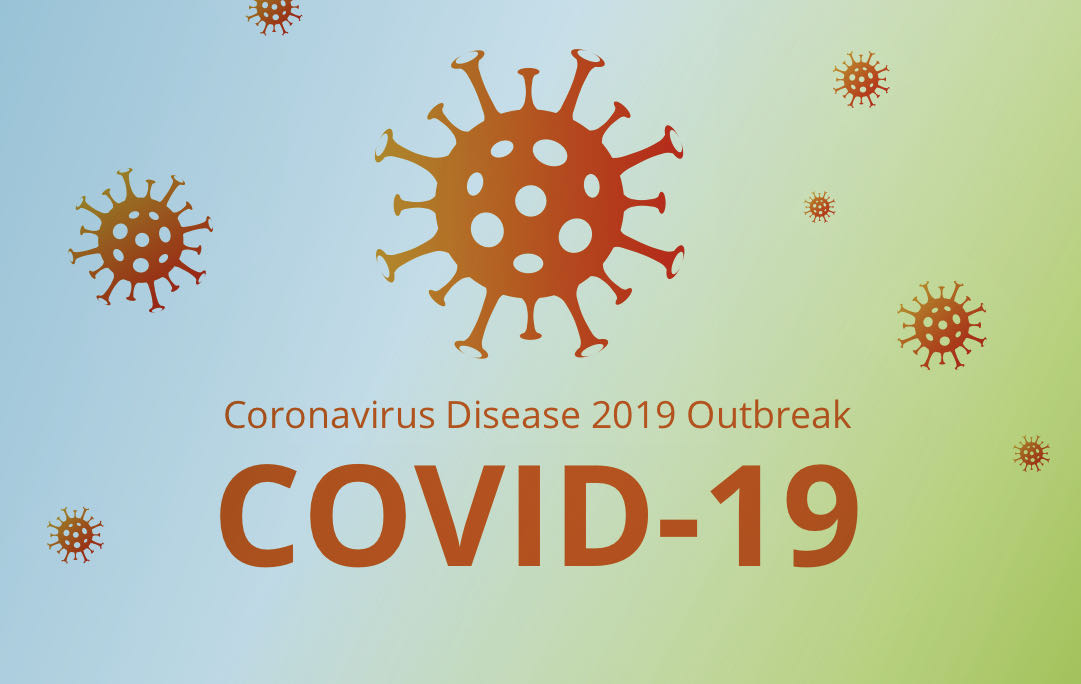
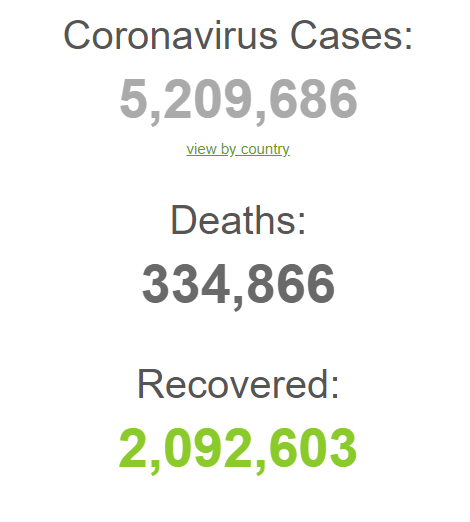

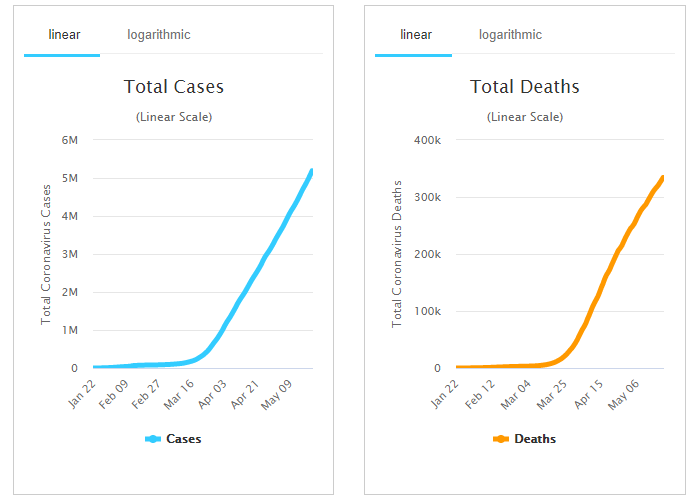
|
Country, |
Total |
New |
Total |
|
World |
5,190,496 |
+107,085 |
334,173 |
|
1,620,902 |
+28,179 |
96,354 |
|
|
317,554 |
+8,849 |
3,099 |
|
|
310,921 |
+17,564 |
20,082 |
|
|
280,117 |
+593 |
27,940 |
|
|
250,908 |
+2,615 |
36,042 |
|
|
228,006 |
+642 |
32,486 |
|
|
181,826 |
+251 |
28,215 |
|
|
179,021 |
+490 |
8,309 |
|
|
153,548 |
+961 |
4,249 |
|
|
129,341 |
+2,392 |
7,249 |
|
|
118,226 |
+6,198 |
3,584 |
|
|
108,769 |
+4,749 |
3,148 |
|
|
82,967 |
+2 |
4,634 |
|
|
81,324 |
+1,182 |
6,152 |
|
|
65,077 |
+2,532 |
351 |
|
|
57,581 |
+3,964 |
589 |
|
|
56,594 |
+2,248 |
6,090 |
|
|
56,235 |
+252 |
9,186 |
|
|
48,091 |
+2,193 |
1,017 |
|
|
44,700 |
+253 |
5,775 |
|
|
38,651 |
+1,554 |
17 |
|
|
35,306 |
+452 |
2,939 |
|
|
33,371 |
+945 |
185 |
|
|
32,172 |
+649 |
3,871 |
|
|
30,694 |
+36 |
1,898 |
|
|
29,912 |
+252 |
1,277 |
|
|
29,812 |
+448 |
23 |
|
|
28,511 |
+1,773 |
408 |
|
|
26,898 |
+894 |
237 |
|
|
24,391 |
+76 |
1,583 |
|
|
20,162 |
+973 |
1,278 |
|
|
20,143 |
+404 |
972 |
|
|
19,706 |
+476 |
579 |
|
|
19,137 |
+1,134 |
369 |
|
|
18,609 |
+1,041 |
129 |
|
|
18,330 |
+643 |
652 |
|
|
17,585 |
+198 |
1,156 |
|
|
16,683 |
+16 |
279 |
|
|
16,424 |
+39 |
777 |
|
|
16,404 |
+51 |
633 |
|
|
15,003 |
+774 |
696 |
|
|
13,657 |
+180 |
448 |
|
|
13,434 |
+213 |
846 |
|
|
11,182 |
+65 |
561 |
|
|
11,122 |
+12 |
264 |
|
|
10,919 |
+86 |
237 |
|
|
10,116 |
+139 |
291 |
|
|
9,931 |
+648 |
416 |
|
|
8,754 |
+33 |
306 |
|
|
8,676 |
+531 |
193 |
|
|
8,309 |
+28 |
235 |
|
|
8,174 |
+286 |
12 |
|
|
7,728 |
+186 |
575 |
|
|
7,234 |
+265 |
35 |
|
|
7,211 |
+78 |
196 |
|
|
7,081 |
+2 |
100 |
|
|
7,059 |
+50 |
114 |
|
|
7,016 |
+339 |
211 |
|
|
6,704 |
+151 |
233 |
|
|
6,493 |
+50 |
306 |
https://www.worldometers.info/coronavirus/
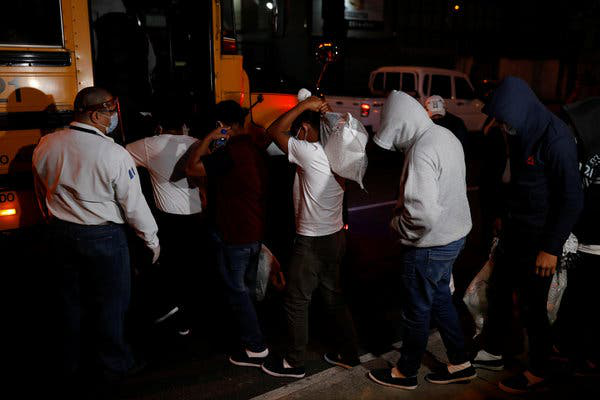
Migrants boarding a bus in Guatemala City after being deported from the United States.Credit...Luis Echeverria/Reuters
Concerns about coronavirus infections have added new dimensions to an already polarizing global debate over migration.
On Thursday in Guatemala, for example, President Alejandro Giammattei voiced frustration over U.S. deportations of people infected with the virus, saying it was causing “serious problems” for his nation’s health system.
“Guatemala is an ally of the United States, but the United States is not Guatemala’s ally,” Mr. Giammattei said. “They don’t treat us like an ally.”
There have been 119 confirmed cases of Covid-19 among people deported from the United States to Guatemala, The Associated Press reported. Some deportees have became a point of contention in Guatemala, where several community councils last month threatened to burn a government building where migrants were quarantined over concerns that they posed a health risk.
In Hungary, the government on Thursday shut down transit zones along the Serbian border where thousands of migrants have been stuck for a year or more. It freed about 300 refugees from the zones, Reuters reported, while also effectively barring future ones from applying for asylum.
Reuters quoted President Viktor Orban’s chief of staff, Gergely Gulyas, as saying that the zones were emptied after an E.U. court ruled that the practice of keeping migrants inside them was unlawful.
And in Britain, Prime Minister Boris Johnson’s government agreed to scrap a policy that requires staff from overseas in the country’s vaunted National Health Service to pay a surcharge — nearly $500 per year for migrants who aren’t from the European Union — to help fund the system in which they work.
Mr. Johnson had previously resisted calls to exempt the workers, saying on Wednesday that his government “must look at the realities” of funding the N.H.S.
But after public pressure mounted, Britain’s health secretary, Matt Hancock, said on Thursday that the workers would be exempted “as soon as possible.” Keir Starmer, the leader of the opposition Labour Party, called it “a victory for common decency.”
A group of 77 Nobel laureates has asked for an investigation into the cancellation of a federal grant to EcoHealth Alliance, a group that researches bat coronaviruses in China.
The pre-eminent scientists characterized the explanation for the decision by the National Institutes of Health as “preposterous.” The agency said the investigation into the sources of pandemics did not fit “with program goals and agency priorities.”
The Nobel recipients said the grant was canceled “just a few days after President Trump responded to a question from a reporter who erroneously claimed that the grant awarded millions of dollars to investigators in Wuhan.” President Trump said the grant would be ended immediately.
The grant had been given to EcoHealth Alliance, an organization with headquarters in New York that studies the potential for spillover of animal viruses to humans around the globe. The group collaborated with the Wuhan Institute of Virology, which has been at the center of conspiracy theories about how the novel coronavirus originated. Virologists and intelligence agencies agree that the virus evolved in nature and spread from animals to humans.
Days after the news conference in April, the National Institutes of Health emailed Peter Daszak, the head of EcoHealth Alliance. They questioned his work with the Wuhan Institute, and after an exchange of emails, he was informed that the renewal of his grant for more than $3 million was canceled.
Harold E. Varmus, a former director of the N.I.H., said that the government always sets broad priorities for research that some scientists may disagree with, including restrictions on use of embryonic stem cells, but that this research was squarely in line with federal priorities. He called the cancellation “an outrageous abuse of political power to control the way science works.”
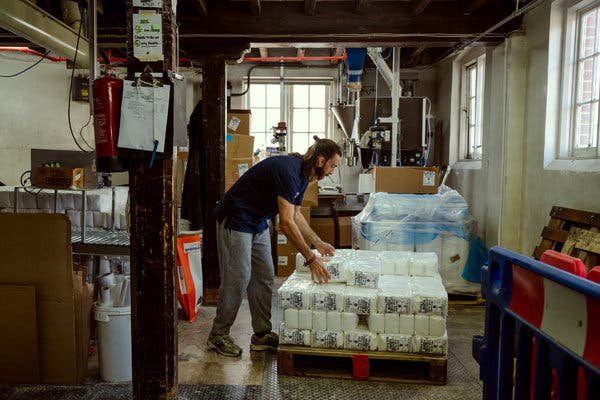
Wessex Mill, an artisanal mill in Wantage, Britain, temporarily ramped up its operation to 24 hours a day, seven days a week.Credit...Alex Atack for The New York Times
The coronavirus outbreak has flooded social media with #coronavirusbaking and #quarantine cookies. Yeast is in short supply, and butter sales have soared. In April, Google searches for cake, bread and flour skyrocketed.
For many, baking serves as a respite from chaos. “One of the ways to interrupt anxiety is to let other senses take over,” the British culinary author and television star Nigella Lawson told The Guardian.
For the Wessex Mill in Oxfordshire, that has meant an unprecedented boom in production. The family-owned mill found itself fielding nearly 600 calls a day in mid-March, and it has ramped up its output fourfold during the crisis.
Emily Munsey, who runs the business with her father, has hired more staff and added shifts to keep the mill running 24 hours a day, seven days a week, for the first time in its 125-year history.
“It’s been very challenging as a company. The amount of work we’ve all had to do has increased a huge amount,” said Ms. Munsey, who has also had to scramble to source packaging to hold the flour. “Demand remains consistently obscene.”
Of course, the outbreak has also ignited demand for flour in other countries. In France, market research by Nielsen showed that demand doubled in March. In Italy, it reached its highest level since World War II.
As Britain begins to ease restrictions, Ms. Munsey hopes that new customers will continue to use the mill’s flour, find new skills and maybe take up more home baking.
Australian border officials said Friday that they had found almost two kilograms, or about 4.4 pounds, of methamphetamine hidden in packages of medical supplies sent from Canada.
The packages were opened by border officers in Sydney in early May. In the first, about two pounds of methamphetamines were hidden under boxes of face masks and bottles of hand sanitizer. In the second, the drugs were stashed inside sanitizer bottles.
It was no surprise that criminals were taking advantage of the pandemic to smuggle drugs into the country, officials said. “We are continuing to detect and stop illicit substances coming into Australia, no matter how they’re being concealed,” said John Fleming, a Border Force superintendent who oversees mail and cargo.
Two weeks ago, much of Australia kicked off a three-stage reopening plan, in which many schools are reopening and cafes, restaurants and pubs are allowed to seat limited numbers of patrons. Officials said today in New South Wales, the country’s most populous state, that the number will be increased to 50 by June 1.
Travel restrictions in the region will also be lifted on that date, they said earlier this week, for the first time in two months.
And Australia, which has reported 100 deaths and over 7,000 cases, also this week extended a ban on visits by cruise ships capable of carrying more than 100 passengers until mid-September. About a third of the deaths have been linked to the Ruby Princess cruise ship, which allowed passengers to disembark without extensive health checks in March.
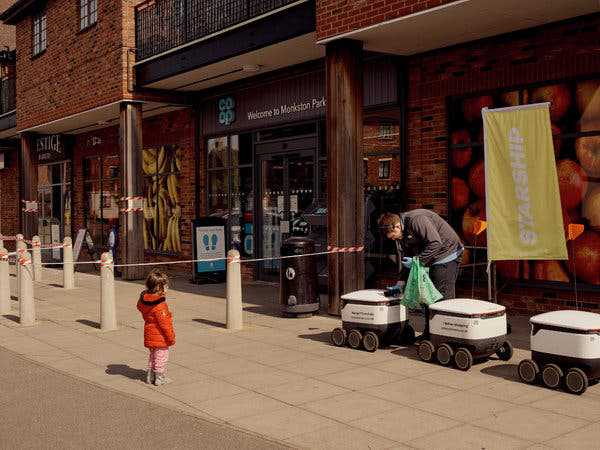
Starship delivery robots being loaded up outside a store in Milton Keynes, England.Credit...Ben Quinton for The New York Times
If any place was prepared for quarantine, it was Milton Keynes. Two years before the pandemic, a start-up called Starship Technologies deployed a fleet of rolling delivery robots in the small city about 50 miles northwest of London.
The squat six-wheeled robots shuttled groceries and dinner orders to homes and offices. As the coronavirus spread, Starship shifted the fleet even further into grocery deliveries. Locals like Emma Maslin could buy from the corner store with no human contact.
“There’s no social interaction with a robot,” Ms. Maslin said.
The sudden usefulness of the robots to people staying in their homes is a tantalizing hint of what the machines could one day accomplish — at least under ideal conditions. Milton Keynes, with a population of 270,000 and a vast network of bicycle paths, is perfectly suited to rolling robots. Demand has been so high in recent weeks, some residents have spent days trying to schedule a delivery.
When the Starship robots first arrived in Milton Keynes, one of the fastest-growing cities in Britain, Liss Page thought they were cute but pointless. “The first time I met one, it was stuck on the curb outside my house,” she said.
Then, in early April, she opened a letter from the National Health Service advising her not to leave the house because her asthma and other conditions made her particularly vulnerable to the coronavirus. In the weeks that followed, the robots provided a much-needed connection to the outside world.
Smaller deliveries suit Ms. Page because she lives alone. But like the grocery vans that deliver larger orders across the city, the Starship robots are ultimately limited by what is on the shelves.
“You pad out the order with things you don’t really need to make the delivery charge worthwhile,” Ms. Page said. “With the last delivery, all I got were the things I didn’t really need.”
Abdi Latif Dahir is a Kenyan who was appointed the East Africa correspondent for The New York Times last year. He has fasted every day of Ramadan since he was 9 years old.
The call to prayer rang on a recent afternoon from Jamia Mosque, a landmark in downtown Nairobi with green and silver domes and multiple minarets. There should be worshipers converging there during this sacred month of Ramadan, but the mosque’s doors remained shut, its prayer halls empty since closing in March because of the coronavirus pandemic.
With no congregation to join, I sat in the car, rolled down the windows and listened to the muezzin’s voice, a mellifluous sound that instantly made me cry.
This is a Ramadan like no other. The pandemic, which in Kenya has infected at least 1,109 people and killed at least 50 others, has given us the gift of loneliness. Isolated under a partial lockdown in Nairobi and a nationwide curfew that stretches from dusk to dawn, millions of Muslims in Kenya and beyond have exchanged sprawling banquets for dining alone and observing the evening taraweeh prayers from home.
I chafe at the imposed restrictions sometimes because, with 21 siblings and 16 nephews and nieces, the iftar meal to break the daily fast has always for me been a bustling family affair. We would start with dates, then gorge on spicy samosas and chicken biryani, pass around my mother’s legendary camel meat, and share cakes and sweet chai.
Many times, particularly when we were young, we would even watch an episode or two of the historical epics or weepy melodramas that are a mainstay of Arab television during Ramadan. But this year, we are getting more than enough drama from real life.
And so we stay physically apart but find unity in the rituals of fasting and feasting. Things might be falling apart, but I have come to find comfort and continuity in the small things: the paneer samosas sent by a friend’s mom, the afternoon runs at a nearby, almost-empty forest, the messages from loved ones checking in from all over the world — and the sound of the azan, the call to prayer, broadcast from the tops of minarets.
President Trump, who has defiantly refused to wear a mask in public despite the recommendations of federal health officials, toured a Ford plant in Michigan on Thursday with his face uncovered. That was against the factory’s guidelines and the direct urging of the state’s attorney general.
Michigan has been hit especially hard by the virus, with more than 50,000 confirmed cases and 5,000 deaths. Mr. Trump said he had put on a mask when he was asked to on a private portion of the tour, showing reporters a navy blue one with the presidential seal on it.
During his visit, Mr. Trump continued to press for the further easing of social-distancing restrictions. He blamed Democrats for keeping the economy closed and suggested voters would punish them in the presidential election and view it as “a November question.”
From CNN's Simon Cullen
The United Kingdom will announce the details of its 14-day mandatory quarantine for international travelers later today, Northern Ireland Secretary Brandon Lewis told Sky News.
The new arrangements will be explained by Home Secretary Priti Patel at the daily coronavirus press briefing, Lewis said.
“We’re a country that welcomes people from all over the world. But it is appropriate that we say that if you’re coming to the United Kingdom, we need to protect your own health and the health of the people of the United Kingdom,” he said.
“And the best way to do that is to ensure people do go through that quarantine period to ensure they have no symptoms and are not able to add to the spread of the virus.”
He added that British citizens will be able to complete the quarantine at home.
Airlines and airport operators have previously warned that a 14-day quarantine will cause significant economic damage to the UK’s tourism and travel industries.
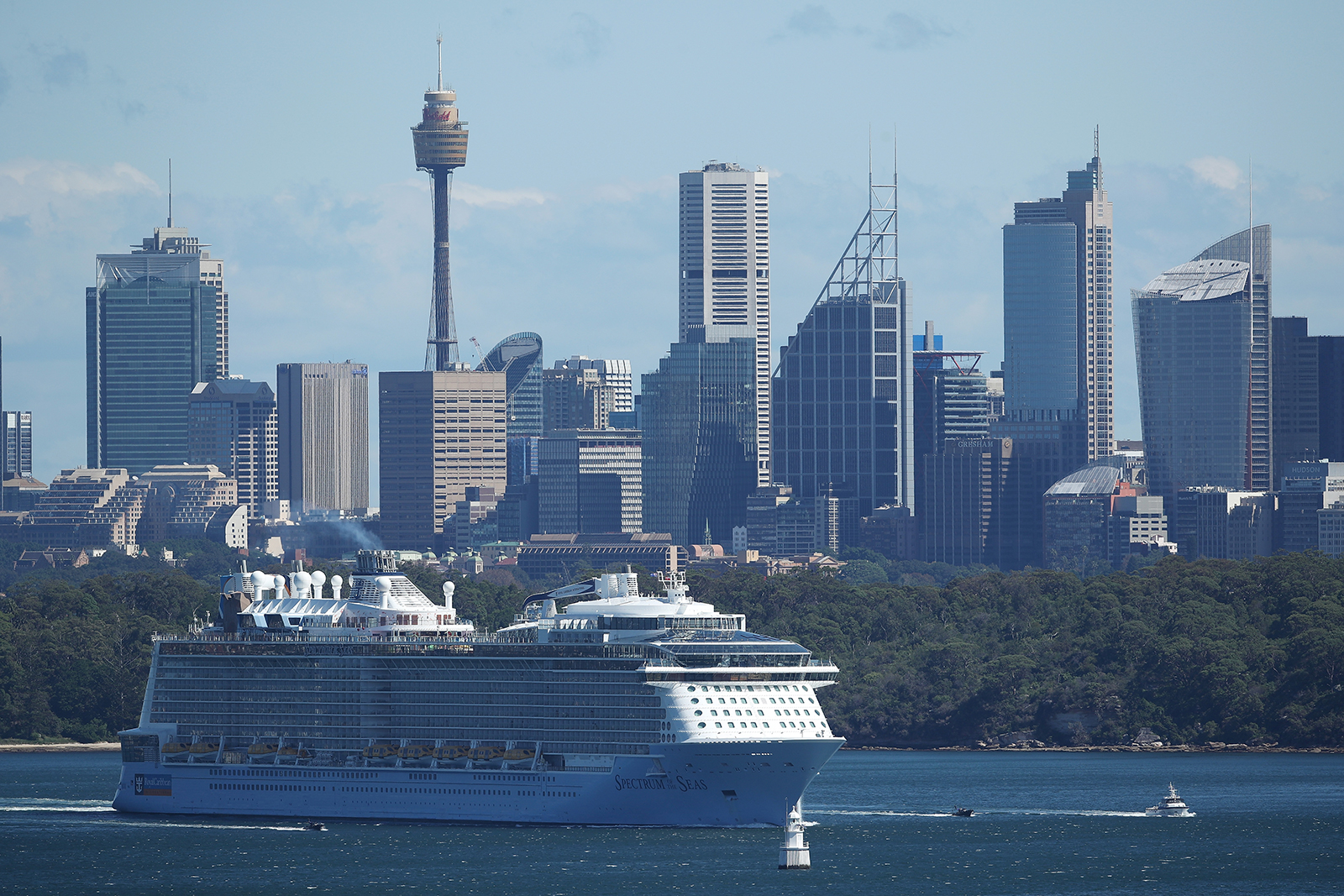
The Spectrum of the Seas cruise ship departs Sydney Harbor on April 4, in Sydney, Australia. Cameron Spencer/Getty Images
Australia has extended a ban on cruise ships entering the country's waters for three more months, according to a statement from the Australian Border Force.
"The current restriction on cruise ships entering Australian waters has been extended for a further three months until 17 September 2020. Any cruise ship capable of carrying more than 100 passengers is prohibited from operating cruises in Australia," the statement said.
Some background: The ban was enacted on March 27 after a spike in coronavirus cases in the country was linked to the Ruby Princess cruise ship, which disembarked in Sydney earlier that month.
More than 600 cases and 15 deaths are associated with the ship, according to Australian public broadcaster ABC.
From CNN's Vedika Sud in New Delhi
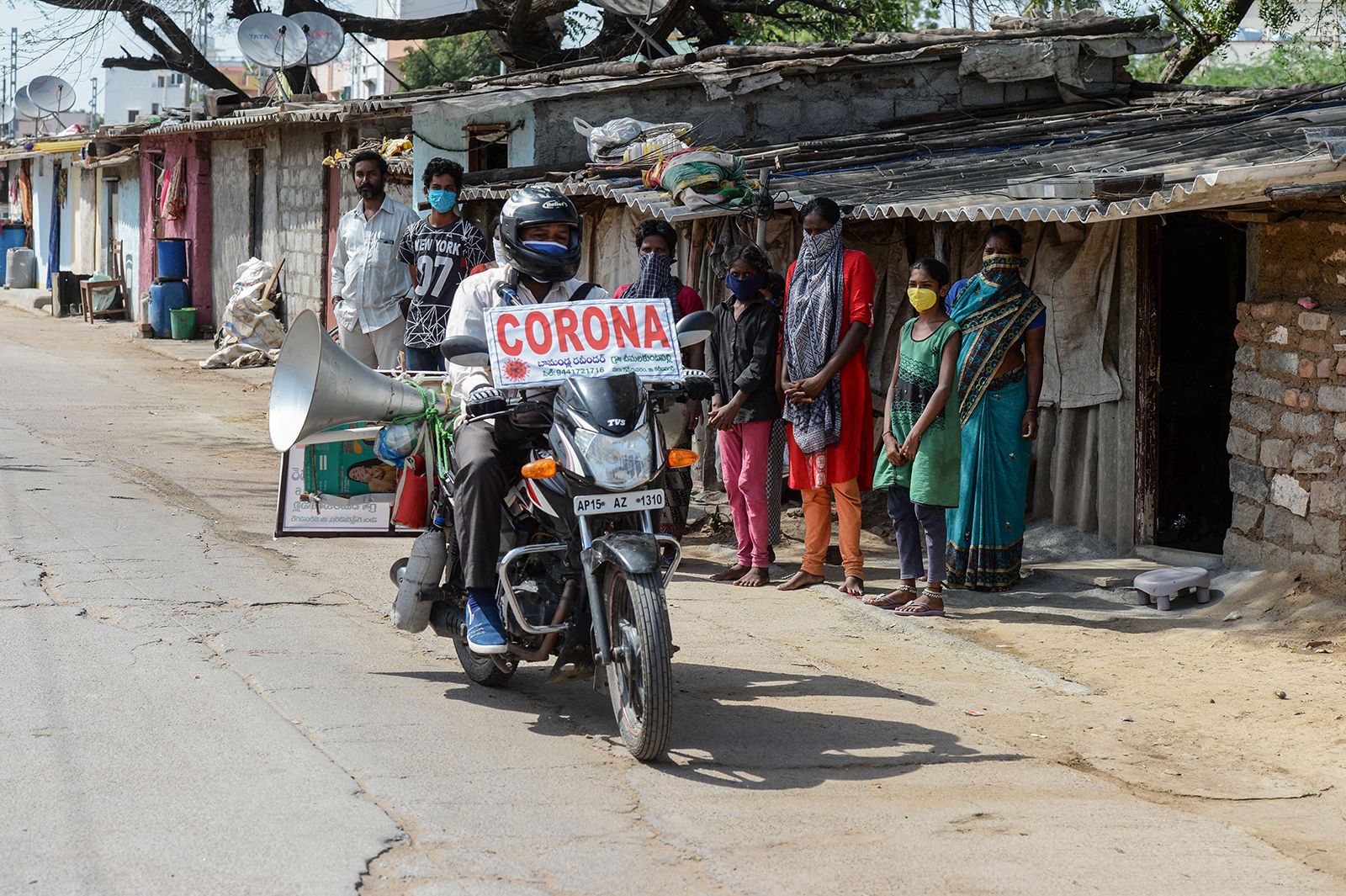
A man tours on his bike in the villages of Telangana state to spread awareness about Covid-19 in Hyderabad on May 21. Noah Seelam/AFP/Getty Images
More than 6,000 people in India have tested positive for Covid-19 in the past 24 hours, the country's Ministry of Health and Family Welfare announced on Friday.
The 6,088 new patients bring the national tally to 118,447 cases. This is India's biggest one-day jump in cases so far.
The death toll stands at 3,583.
Of the total cases, more than 48,500 patients have recovered, according to the ministry.
More than 2.7 million tests have been conducted nationwide, according to the Indian Council of Medical Research.
Communities in the United States may be getting overconfident in their ability to accommodate Covid-19 patients in hospitals, the former acting head of the Centers for Medicare and Medicaid Services has warned.
Intensive care units need higher capacity than many people realize, former CMS acting director Andy Slavitt told CNN on Thursday night.
“Once you get to about 70 to 75% of ICU bed capacity, because of how long it takes for a case to turn into hospitalization, you will quickly run out of hospital capacity,” Slavitt says. “You’ll be able to see it coming, but you might not see it until it’s too late.”
Slavitt said the economy could reopen safely -- but only if there is enough testing to address hot spots.
“Nothing magic happened while we were staying home,” Slavitt says. “It’s not like the virus got less contagious or less deadly.”
From CNN's Junko Ogura in Tokyo
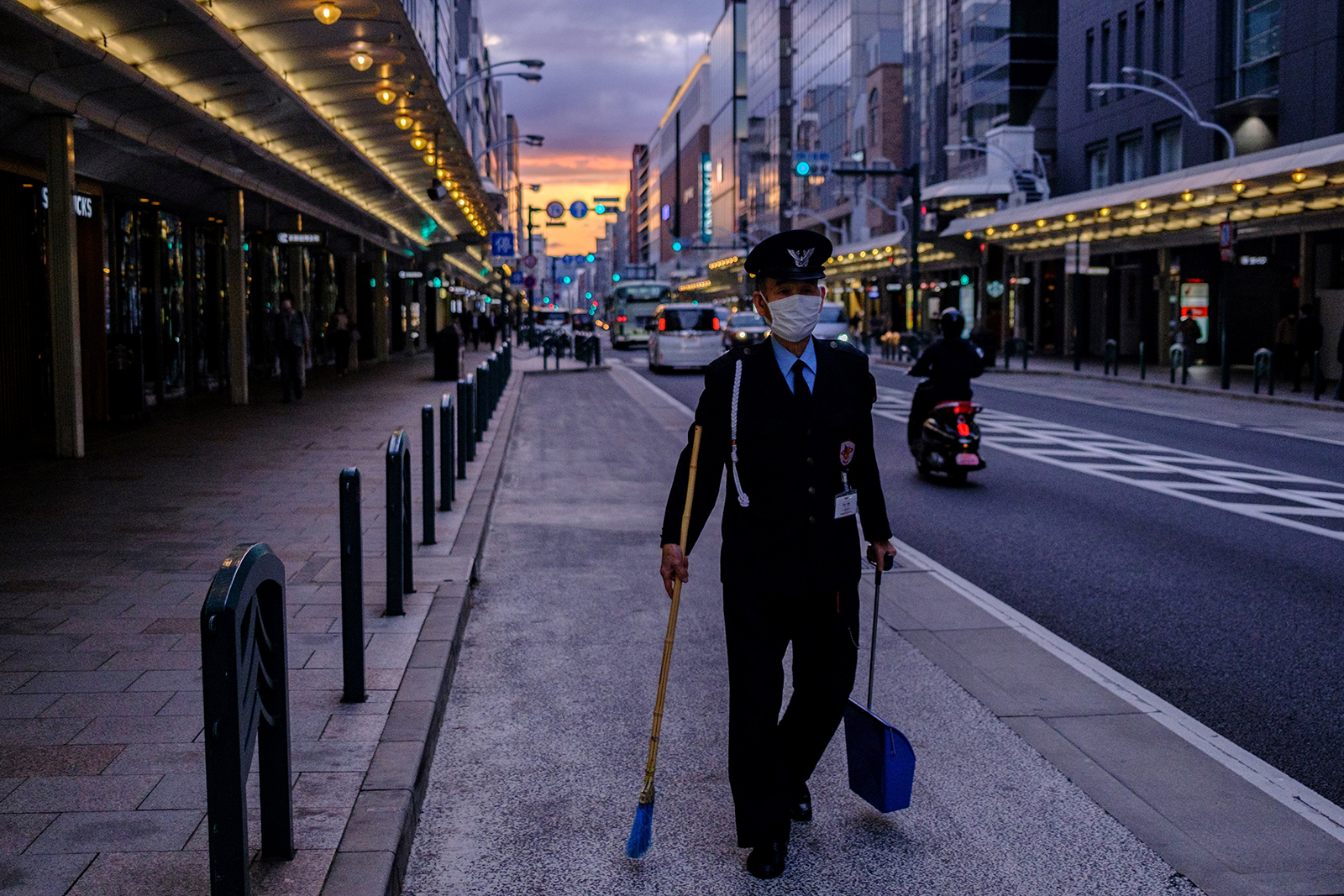
A security guard wearing a face mask walks with a broom in Kyoto on May 21. Philip Fong/AFP via Getty Images
Japan on Thursday lifted the state of emergency in three prefectures: Osaka, Kyoto and Hyogo.
The state of emergency -- enacted to curb the spread of coronavirus -- remains in place for five hardest-hit regions, including Tokyo and Hokkaido. The government will convene on Monday to decide whether to lift the order in those places
The government had imposed a nationwide state of emergency on April 16, and lifted it for most of the country last Thursday.
New cases: Japan recorded 43 new coronavirus cases and 19 deaths on Thursday, according to the health ministry.
That raises the national total to 17,051 cases and 809 deaths. Of those, more than 700 cases and at least 13 deaths are linked to the Diamond Princess cruise ship, which was docked in quarantine at Yokohama Bay for two weeks in February.
From CNN’s Matt Rivers in Mexico City
Workers carry the plastic-wrapped coffin of a patient who died from Covid-19 into the crematorium at San Cristobal Mausoleums in Ecatepec, Mexico State, on Thursday. Rebecca Blackwell/AP
Mexico reported nearly 3,000 new coronavirus cases on Thursday evening -- the country's biggest one-day jump in infections since the pandemic began.
The 2,973 new cases raise the national total to 59,567 -- the third-highest in Latin America behind Brazil and Peru.
Mexico also reported an additional 420 fatalities, bringing the country's death toll to 6,510.
Mexicans will need to observe social distancing guidelines and stay home until at least May 31, when some parts of the economy will slowly reopen, said Deputy Health Secretary Hugo López-Gatell, the epidemiologist leading the government’s Covid-19 response.
He specifically pointed to the state of Tabasco on Thursday, which recently experienced a surge in cases after some social distancing guidelines were relaxed in early May.
From CNN Health’s Michael Nedelman and Arman Azad
The US Centers for Disease Control and Prevention posted new guidance on its website that estimates that about a third of coronavirus infections are asymptomatic.
The agency also says its “best estimate” is that 0.4% of people who show symptoms and have Covid-19 will die, and it estimates that 40% of coronavirus transmission is occurring before people feel sick.
In the guidance, intended for modelers and public health officials, the CDC outlines five potential scenarios. Four represent “the lower and upper bounds of disease severity and viral transmissibility.” The fifth is the CDC’s “current best estimate about viral transmission and disease severity in the United States.”
In that scenario, the agency describes its estimate that 0.4% of people who feel sick with Covid-19 will die. For people age 65 and older, the CDC puts that number at 1.3%. For people 49 and under, the agency says 0.05% of symptomatic people will die. It assumes that people without symptoms are every bit as infectious as those with symptoms.
The agency also estimates that 3.4% of symptomatic people with Covid-19 will require hospitalization, with that number rising to 7.4% in people 65 and older.
In the most severe scenario, the CDC assumes that 1% of people overall with Covid-19 and symptoms will die. In the least severe scenario, the CDC puts that number at 0.2%.
“The scenarios are intended to advance public health preparedness and planning. They are not predictions or estimates of the expected impact of COVID-19,” the CDC says.
The agency also notes that its numbers could change as more is learned about Covid-19, and says they do not “reflect the impact of any behavioral changes, social distancing, or other interventions.” That would be relevant for some of the agency’s estimates, such as how many infections stem from each case.
With those caveats, the CDC said the new numbers are based on real data received before April 29. The CDC characterized them as preliminary estimates from federal agencies, including the CDC and the HHS Office of the Assistant Secretary for Preparedness and Response.
Source:https://edition.cnn.com/world/live-news/coronavirus-pandemic-05-22-20-intl/index.html
If you are just joining the blog, here’s a summary of the key events so far:
Global infections have passed 5.1 million, deaths pass 332,000: Global cases stand at 5,102,573, with deaths reported at 332,924, according to the Johns Hopkins university tracker. Deaths in the US, stand at 94,702. The UK’s death toll is 36,124, with 252,246 infections
China has not set a GDP target in due to “great uncertainty”: Beijing has taken the rate step of not setting a GDP target for the first time since it began publishing such goals in 1990. Instead, given “great uncertainty” caused by the Covid-19 pandemic, China will “give priority to stabilising employment and ensuring living standards”, Premier Li Keqiang told the opening of the National People’s Congress. He also said governments at all levels should “tighten their belts”, and that all types of surplus, idle and carryover funds will be withdrawn and re-allocated, to be put to better use. China reported four new cases of Covid-19 on Friday.
Trump didn’t wear mask at factory visit and has pushed for churches to open: The president toured a Ford plant in the battleground state of Michigan, without wearing a face mask in front of TV cameras. The plant had been recast to produce ventilators and personal protective equipment. On Tuesday Ford said its policy was that all visitors must wear face masks. Trump told reporters he had put one on out of the view of cameras: “I had one on before. I wore one in the back area. I didn’t want to give the press the pleasure of seeing it,” he said. Earlier Trump said there would be an announcement “very soon” on reopening churches to the public.
Brazil has passed 20,000 deaths: Latin America’s biggest country passed the grim milestone with a record one-day death toll of 1,188, taking the confirmed total to 20,047. The country has 310,087 infections, third behind the US (1,577,287) and Russia (317,554). President Bolsonaro, a long-running advocate of malaria drug chloroquine to treat Covid-19, said on Thursday he knew there was no proof it works, but said there are cases in which it appears to have been successful.
Russia’s industrial output dropped 6.5% in April: The country’s economic performance was hit by the coronavirus lockdown. The state statistics agency said “consumer demand fell for a range of goods and services”. Russia’s commodities sector only decreased by 3.2% year-on-year, and oil production actually grew by 0.2%. Pharmaceutical industries grew by 13.5%, year-on-year.
Indonesia has had its biggest one day jump in cases: The world’s fourth most populous country reported 973 new infections on Thursday, bringing the total number of confirmed cases to 20,162. The authorities have asked the military and the police to prevent arrivals in Jakarta.
South Korea has reported 20 new cases: The new coronavirus cases came as health authorities worked to contain the cluster connected to Seoul nightclubs. South Korea has had a total of 11,142 infections and 264 deaths.
Australian’s most populous state eased restrictions further: New South Wales has announced cafes and restaurants will be allowed to have up to 50 patrons from 1 June, up from 10 currently allowed. Australia has had remarkable success in flattening the curve of infections from the coronavirus. The country of 25m has recorded 101 deaths and just over 7,000 cases. The country is consistently recording fewer than 20 new cases a day.
Tributes have flowed for the former White House butler who died from Covid-19: Wilson Jerman, who has died from Covid-19, aged 91, was a fixture in the White House under 11 presidents. Jerman started working as a cleaner under Dwight Eisenhower and retired as an elevator operator during the presidency of Barack Obama. Michelle Obama said: “With his kindness and care, Wilson Jerman helped make the White House a home for decades of first families, including ours.”